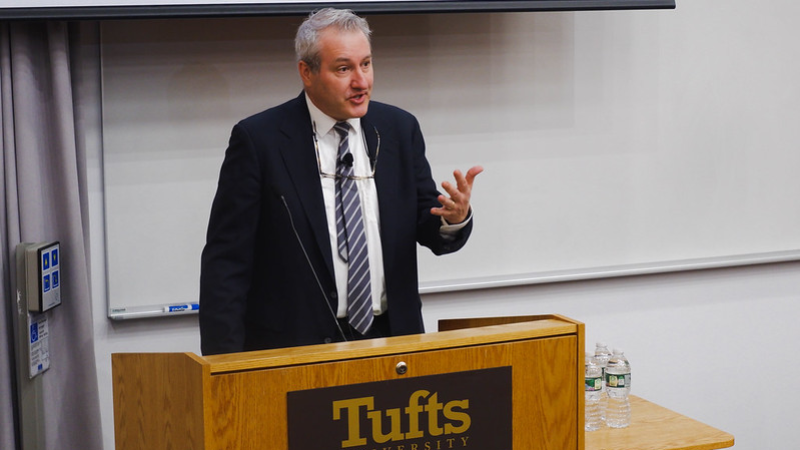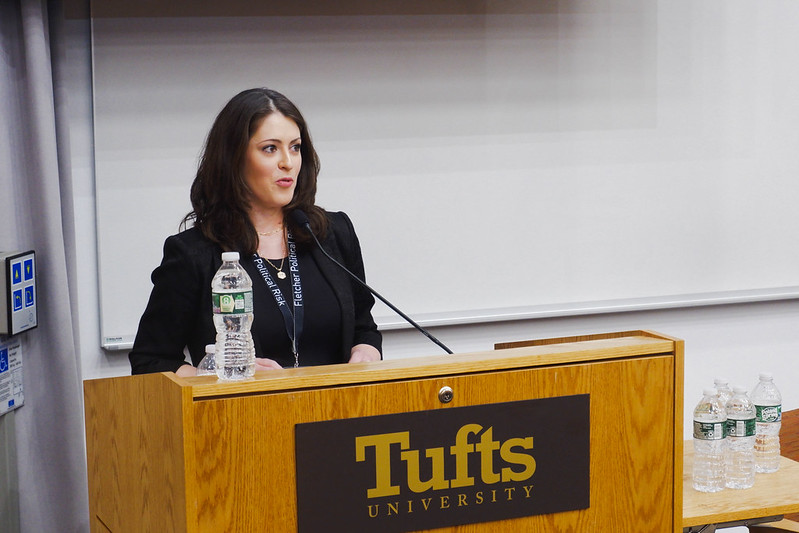
Fletcher Political Risk Group Hosts Discussion on the Global Semiconductor Industry
By Vishal Manve, MALD 2023 Candidate, The Fletcher School
On March 10, 2023, the Fletcher Political Risk Conference hosted a discussion between Professor Chris Miller, author of “Chip War: The Fight for The World’s Most Critical Technology,” and Dean of Global Business Bhaskar Chakravorti. The conference was held on the Fletcher campus on March 9 and 10 on the theme “The Great Transition: An Attempted Shift Towards Autonomy.” The conversation addressed the intersection of geopolitics and technology, focusing on semiconductors and supply chain shocks, the rise of middle powers, and the use of AI in understanding global risk assessments.
Professor Miller suggested that the chip industry and the entire electronics industry are returning to their origins, when political and military dynamics profoundly influenced their development. The first semiconductors emerged from the Cold War arms race, and the first large-scale use of chips was in missile guidance systems in warheads intended for use against the Soviet Union. However, for much of the past 30 years, the chip industry has sold most of its chips for civilian usage; only a small percentage of chips end up in military systems.
“We face a growing arms race in East Asia, which we’ve seen growing in intensity every year. Over the last decade, governments from Beijing to Washington to Tokyo and others have been thinking about the chip industry, not only in terms of smartphones but also in terms of the military and strategic applications,” Miller said.
He further reiterated the history of the computing industry, highlighting how governments have always used advanced capabilities for intelligence and military purposes. As a result, governments around the world are trying to reshape chip supply chains to suit their political interests.
The electronics industry, which constitutes almost a quarter of global trade, is rapidly changing under pressure from new risk assessments in corporate boardrooms and new demands by governments to reshape the way they do business, Miller noted.
Chakravorti also questioned Miller on the potential forecasts for global trade. Miller responded, “We are witnessing the early stages of a significant shift in the way the world’s electronics are produced. Currently, the assembly base takes place almost exclusively in China. However, in the future, there will be a much more diversified and possibly more expensive assembly base that will rely heavily on Vietnam, India, other countries in Southeast Asia, and possibly in Mexico as well.”
Miller further added that this long-term shift will take years to develop, and will have dramatic implications for the countries and companies involved as the costs across the industry increase.
“It will also have downsides for China, which will lose its dominant role today in electronics assembly, although it will still be an important player,” Miller explained.
Chakravorti expressed skepticism about the manufacturing landscape, specifically in regards to the manufacture of high-end chips which Miller had suggested may be made in India.
Miller noted that there have been significant workforce issues in these countries in the past, but he highlighted that changes were currently underway. For example, he mentioned that Apple has recently convinced an Indian state to change its labor laws, which is a “noteworthy accomplishment given the historical difficulty of changing such laws in India.”
Professor Miller further observed that the economics of manufacturing are shifting, as wages in China have risen and become more expensive than those in India. Therefore, even if India may be slightly less efficient than China, the lower labor costs there could make economic sense for some manufacturers.
After the event, Isha Vajpeyi, MALD 2023 and co-chair of the Fletcher Political Risk Group, said, “This conversation was pertinent, spotlighting key crucial developments in supply chain and semiconductors. As a co-leader, I was excited to see some of the most important voices in the industry convene at the conference and offer insights on how the landscape will shift in the near term.”

